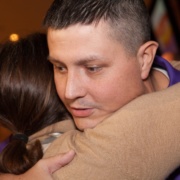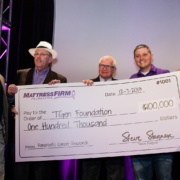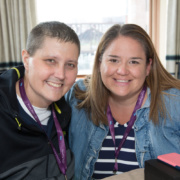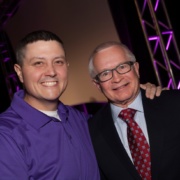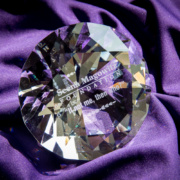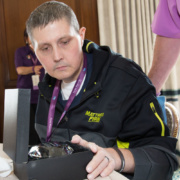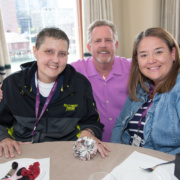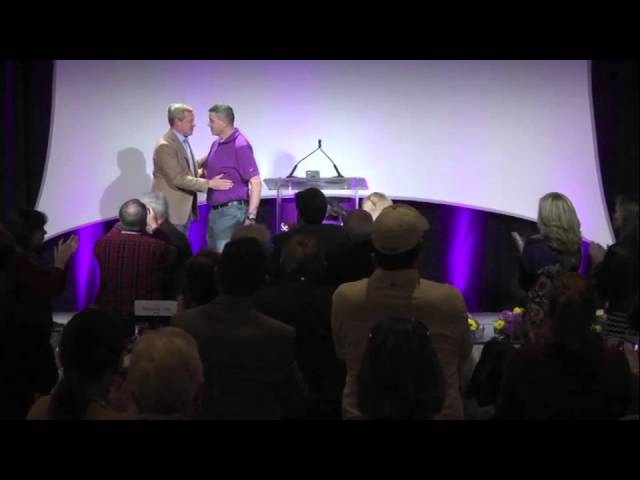Editor’s Note
It is with deep sorrow we announce the passing of our Warrior, Steven Burdge Jr. on January 1, 2021 at the young age of 39. Originally diagnosed with pancreatic cancer in November, 2012, Steve fought valiantly for over 8 years against all odds. Our deepest sympathies are with his family and loved-ones during these difficult times.
It is important to note that Steve subsequently likely learned his cancer resulted from a hereditary genetic mutation called “Lynch Syndrome” which has been linked to pancreatic cancer which wold likely explain being stricken at the young age of 31. All patients should discuss family history with their family practitioners and recommendations for genetic counseling and testing to expose any possible predisposition to any cancer. If genetic links are discovered, surveillance monitoring programs for early detection can be implemented.
Following Was Steve’s Original Warrior Story
For many Americans, the onset of Labor Day weekend means burgers, BBQs and back-to-school shopping, but for Steve Burdge, the late-August celebration of summer’s last hurrah serves as an annual reminder of one of the biggest struggles he’s ever faced.
It all began on Labor Day weekend of 2012, when Steve started experiencing pains severe enough to warrant a visit to the emergency room. Doctors there told him he had a bad bout of the flu before prescribing antibiotics and sending him on his way. By October, though, his symptoms had not only returned, but substantially worsened, and a subsequent visit to the doctor led to a gallstones diagnosis and a recommendation for surgery.
Upon waking up from that surgery, Steve heard news that no 30-year-old father of two expects to hear: He did not, in fact, have gallstones – he had a tumor that turned out to be pancreatic cancer.
“I was in the deepest, darkest hole someone could ever be in,” Steve said, of the weeks and months following his diagnosis, which involved intensive chemotherapy, radiation, and, ultimately, the Whipple Surgery, a highly invasive procedure that brought with it considerable complications. Steve also learned that his own cancer likely resulted from a genetic condition called Lynch Syndrome, which would explain why so many family members on his mother’s side also battled various forms of the disease. Upon getting his own children tested, he found out that his daughter, too, had Lynch syndrome, but detecting it early meant that she could receive preventative care to help manage it.
Coming to terms with his own pancreatic cancer diagnosis, and then his daughter’s Lynch syndrome diagnosis, was immensely difficult, but some of the strongest support he received along the way was from his own employer, Mattress Firm, which happened to be one of the nation’s most prolific fundraisers for pancreatic cancer research.
Through his employer, Steve learned of the tireless work of Dr. Daniel Von Hoff, and when his disease returned, he found himself meeting with the doctor in Arizona. In discussing Steve’s condition and treatment, Dr. Von Hoff mentioned touching base with “Dr. Lynch,” and it took a few moments for Steve to realize that his doctor was referencing the very physician who discovered his rare gene mutation in the first place. It was then that he realized the depth of the world of opportunity opened up by Dr. Von Hoff, and how he could now, thanks to the doctor, connect with world’s best and brightest minds in the fight against cancer.
“Dr. Von Hoff was willing to put Steve on a higher dose of chemotherapy than other doctors we’d seen,” said Steve’s wife, Susan. “His willingness to push the envelope may well be why Steve is still here.”
Because of the uncertainty surrounding Steve’s future, he chose to put together graduation and wedding presents for his children ahead of time in the event he’d be unable to be there for these milestones. Now, though, as his son begins his senior year of high school, it seems Steve just may be able to give him that graduation gift, himself.
Sources of More Information
Nine-Fold Higher Risk of Pancreatic Cancer With Lynch Syndrome
Genetic Mutations and Pancreatic Cancer
The Predisposition To Pancreatic Cancer and Other Cancers With Lynch Syndrome
Young people are also at risk of getting pancreatic cancer. An example is Steve Burdge who was diagnosed with pancreatic cancer at age 30. Consider linking to this article to make others aware of the potential risk cancer in families with a history of carrying the Lynch Gene Mutation.


